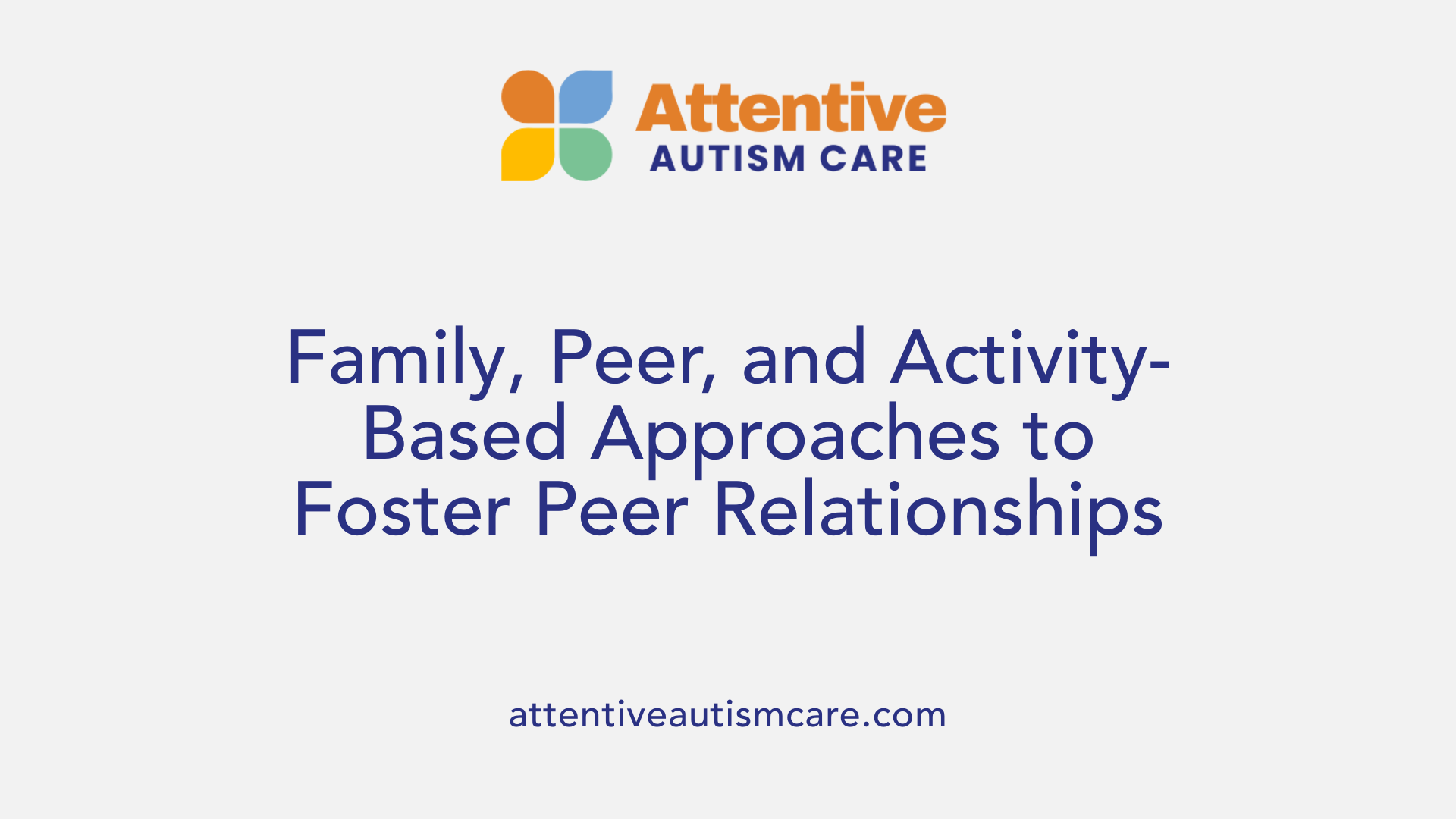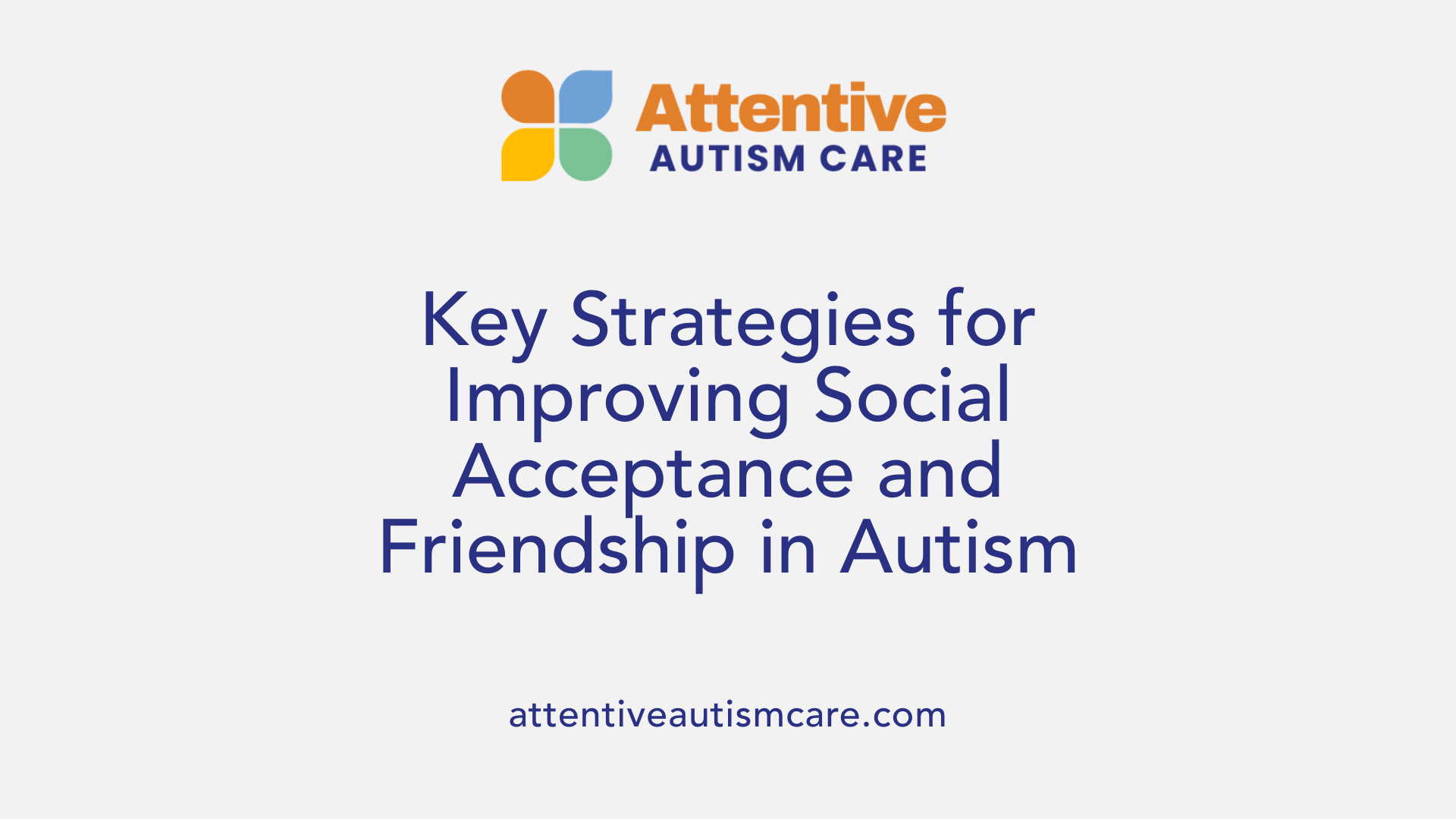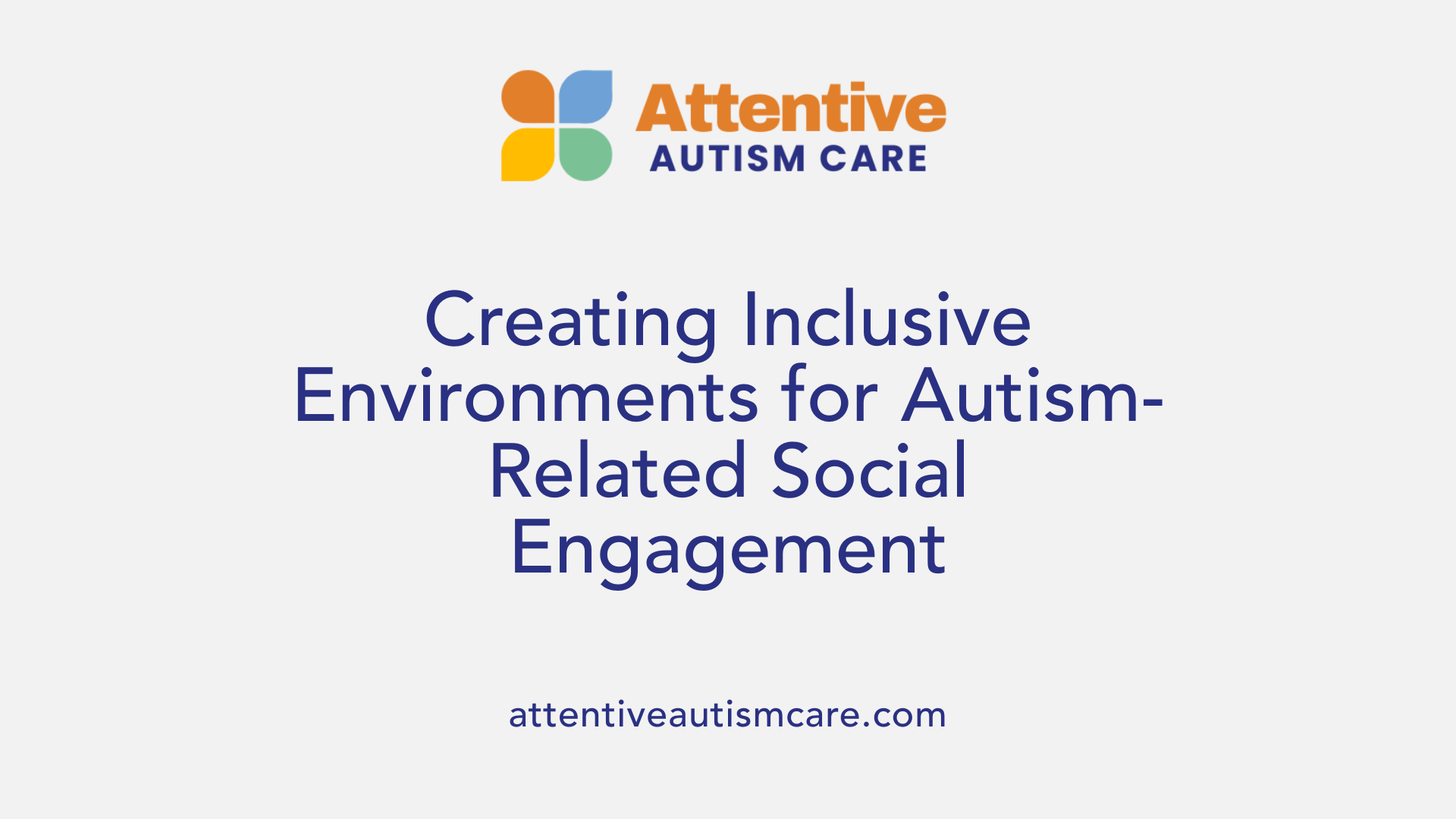Supporting Autistic Children in Developing Peer Relationships
Creating Connections: Strategies to Enhance Social Bonds in Autistic Children

Understanding and Supporting Peer Relationships for Children with Autism
Supporting autistic children in developing peer relationships is vital for their social, emotional, and educational well-being. While children with autism often face unique challenges in socialization, recent research and innovative interventions highlight effective pathways to foster meaningful friendships, acceptance, and inclusion. This article explores evidence-based strategies, research-informed methods, and practical guidance for educators, caregivers, and community members dedicated to enhancing social interactions among autistic children across diverse settings.
Interventions that Promote Peer Engagement and Friendship Building

What strategies and interventions can support autistic children in developing peer relationships?
Supporting children with autism spectrum disorder (ASD) in building peer relationships involves a variety of evidence-based approaches tailored to their unique social and communication needs.
One effective strategy is the use of clinic-based interventions like the Early Start Denver Model (ESDM), which emphasizes personalized, play-based learning. This approach helps children develop social skills within engaging activities that promote positive interactions among peers, parents, and therapists.
Peer-mediated interventions (PMIs) are another proven method. These involve training typical peers to support social interactions, encouraging shared activities such as playdates, group games, and role-playing exercises. Such shared experiences foster natural social communication and help children with ASD learn cues and reciprocal interactions.
Family involvement also plays a vital role. Parent coaching and family-centered programs empower caregivers to model appropriate social behaviors and facilitate interactions. Teaching families how to incorporate social skills practice into everyday routines ensures consistency and supports generalization of learned skills.
Assessments tailored to each child's individual profile identify specific strengths and challenges, allowing for targeted intervention planning. Combining these assessments with ongoing progress monitoring helps adjust strategies to maximize social engagement.
Interest-based activities integrated into social settings further enhance motivation and participation. For example, clubs or groups centered around specific interests—such as music, video games, or visual arts—encourage children to connect over shared passions.
In summary, a mix of personalized, inclusive, and engaging interventions—ranging from clinician-led programs to peer support and family involvement—can significantly improve social skills and foster meaningful peer relationships in children with autism.
| Intervention Type | Focus Area | Example Activities | Additional Notes |
|---|---|---|---|
| Clinic-based programs | Social skill development | Play-based sessions, relationship building | Tailored to individual needs |
| Peer-mediated approaches | Peer support and role modeling | Playdates, group activities | Promote natural interaction |
| Family involvement | Home-based support | Parental coaching, everyday social routines | Ensures consistency |
| Interest-based groups | Motivation and engagement | Clubs focused on shared interests | Sustains participation and enjoyment |
Research-Based Methods to Foster Friendships and Social Acceptance

What research-based methods can be used to foster friendships and social acceptance for autistic children?
Supporting social acceptance and friendship development in children with autism involves multiple strategies grounded in research. Social skills training helps children learn communication, turn-taking, and emotional recognition, which are crucial for meaningful interactions.
Peermediated programs are especially effective, involving typically developing peers in structured activities that encourage social engagement. These programs promote inclusion while providing real-life opportunities for children with autism to practice social skills.
Adult-mediation strategies, including coaching and modeling, guide children in supportive behaviors, helping them navigate social situations more confidently. Teachers and caregivers can support this process by structuring small, interest-based social groups or clubs where children can connect over shared hobbies.
Assessment methods such as parent reports, peer nominations, and observational measures allow educators and clinicians to evaluate the development of friendships and social skills over time.
Creating supportive and inclusive environments is essential. This includes environmental placement, clear behavioral expectations, and teaching specific social cues like facial expressions and body language.
Teaching emotional literacy—helping children recognize and articulate feelings—also plays a vital role. This allows children to better understand peer emotions and respond appropriately.
Overall, combining these approaches enhances social acceptance and promotes the formation of reciprocal friendships, contributing to improved quality of life and mental well-being for children with autism.
Facilitating Peer Engagement: Practical Strategies for Educators and Caregivers

How can educators, caregivers, and parents facilitate peer engagement for children with autism?
Supporting social development in children with autism requires intentional strategies that promote interaction, understanding, and acceptance. Educators, caregivers, and parents can implement several approaches to create an environment conducive to peer engagement.
One effective method is the use of peer-mediated support strategies. These involve training typically developing peers to interact positively and inclusively with children with autism. Such programs foster mutual respect and understanding, helping children with autism develop meaningful friendships. School-based initiatives like the 'Making Friends' program or the PEERS program actively involve families and peers through activities like shared stories, cooperative tasks, and social skills training, all emphasizing the strengths and diversity of each child.
Creating structured social opportunities is also crucial. Teachers and caregivers can plan activities such as small group projects, games, or shared interests that encourage interaction in a natural, engaging manner. Visual supports, role-playing, and social narratives help teach children appropriate social behaviors while also making interactions predictable and less overwhelming.
Inclusive activities that incorporate children’s interests can motivate participation. For instance, clubs focused on music, art, or technology allow children with autism to connect in areas they enjoy, facilitating both social engagement and skill development.
Supporting environments through environmental modifications can significantly aid social interaction. This includes designing classrooms and community spaces with sensory-friendly areas, clear signage, and predictable routines to reduce anxiety and sensory overload.
Family and community involvement further strengthens social opportunities. Parents can encourage participation in local community groups, sports, or clubs that celebrate neurodiversity and foster acceptance. Family outings, social skills workshops, and community events provide additional platforms for children to develop and practice social skills.
Lastly, leveraging technology and online platforms can supplement real-world social interactions, particularly where systemic resources are limited. Virtual support groups, social skills apps, and online mentorship programs offer flexible options for ongoing social engagement.
In summary, a combination of structured activities, modeling, inclusive practices, community participation, and environmental adaptations creates a supportive framework that enhances peer engagement and nurtures social growth in children with autism.
Understanding Social Challenges and Mechanisms in Peer Relationships
What are the social challenges faced by autistic children and the mechanisms involved in their peer relationships?
Children with autism spectrum disorder (ASD), including those with Asperger’s Disorder, often encounter notable difficulties in establishing and maintaining peer relationships. Core challenges include struggles with communication, interpreting nonverbal cues such as facial expressions and body language, and understanding social norms.
These impairments can make social interactions confusing and overwhelming, leading to behaviors like withdrawing, indifference, or formal speech usage in social settings. Many children with ASD desire friendships but lack the skills or confidence to initiate and sustain them, which can result in social isolation.
Stigma and exclusion further complicate these issues. Peer rejection and bullying are common, contributing to feelings of loneliness and negatively impacting mental health. Additionally, sensory sensitivities and literal thinking often interfere with social exchanges like group games or casual chats, reducing opportunities for meaningful contact.
Understanding the mechanisms behind these peer challenges involves examining deficits in social skills such as joint attention, imitation, empathy, and reciprocity. Children with ASD may have trouble recognizing others' feelings or sharing interests, leading to reduced peer engagement. Stress and anxiety during social interactions can also hinder skill development, creating a cycle of withdrawal.
Support strategies that have proven effective include social skills training, peer-mediated interventions, and social stories that clarify social rules and expectations. Incorporating children’s interests into social activities, often through interest-based clubs and inclusive programs, can increase engagement and promote natural, meaningful interactions.
Research highlights that early, inclusive, and naturalistic interventions foster better social understanding and lasting peer relationships. Creating supportive environments and promoting understanding among peers are essential steps toward reducing stigma and fostering friendships.
| Challenges in Social Interaction | Underlying Mechanisms | Support Strategies |
|---|---|---|
| Difficulties interpreting nonverbal cues | Social skill deficits such as limited empathy and reciprocity | Social stories, modeling, visual aids |
| Social withdrawal or indifference | Anxiety and sensory sensitivities | Interest-based group activities |
| Challenges forming reciprocal friendships | Impairments in communication and shared understanding | Peer-mediated support, inclusive programs |
| Stigmatization and bullying | Lack of awareness and acceptance | Anti-bullying education, peer awareness programs |
Understanding these complex mechanisms and challenges underscores the importance of early, inclusive, and interest-based interventions. These efforts can help autistic children develop the social skills necessary for forming meaningful friendships, ultimately improving their social well-being and quality of life.
The Role of Inclusive Education and Community Programs
What inclusive classroom strategies support social interaction for children with autism?
Creative, supportive approaches in the classroom are essential for encouraging social engagement among students with autism. Teachers can create small, structured social groups centered around specific interests or topics, which help children build relationships in a natural setting. Using visual aids, social narratives, and cartooning can clarify social rules and expectations, making interactions less overwhelming.
Assigning roles during group activities and allowing students to choose their roles can prevent exclusion and foster a sense of belonging. Modeling inclusive communication and setting clear norms promote respectful, understanding peer behaviors. Additionally, incorporating quiet stations or side-by-side activities respects different social styles, enabling all children to participate meaningfully.
Integrating these strategies into daily routines, along with monitoring social interactions for signs of exclusion, enhances inclusion and full participation for children with autism.
Fostering Lifelong Inclusion and Support in Peer Relationships
Supporting autistic children in developing peer relationships requires a multi-faceted approach that integrates evidence-based interventions, naturalistic inclusion, and community engagement. Personalized social skills training, peer-mediated programs, and caregiver involvement are key to creating supportive environments where children feel accepted and understood. Schools, families, and communities play vital roles in reducing barriers, fostering empathy, and promoting inclusive activities that build meaningful friendships. As research continues to evolve, the emphasis remains on sustainable, natural, and interest-driven strategies that empower children with autism to thrive socially across all spheres of life, ultimately enriching their quality of life and social well-being.
References
- Improving Social Engagement and Initiations between ...
- Autism and Social Skills Development
- Peer Relationships Among Children With ASD ...
- Supporting Peer Relationships and Friendships for School ...
- Peer Support in Autism
- Making friends - supporting your autistic child
- Peer Relationships and Autism: Building Real Inclusion ...
- Social difficulties in autism | KU SOE
- Effect of social skills training on interpersonal interactions ...




































































































